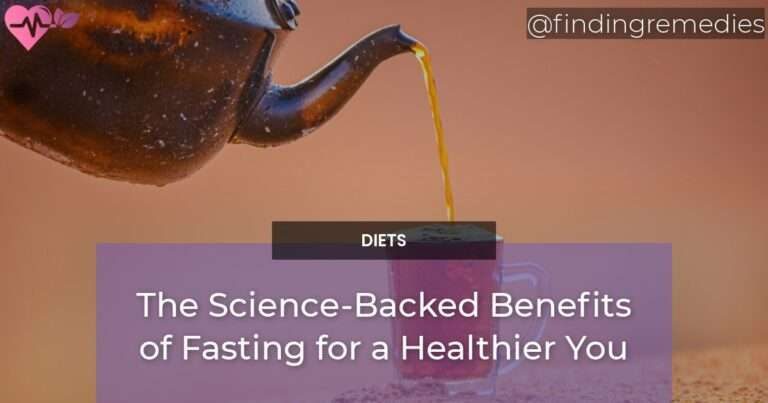Are you looking for an easy way to become healthier and improve your overall wellbeing? Fasting may just be the answer you have been looking for! Although it has been used for centuries for spiritual and religious purposes, fasting has recently become popular for its many health benefits.
In this article, we will discuss the science-backed benefits of a fasting diet, and how it can lead to a healthier you.
Table of Contents
What is a Fasting Diet?
A fasting diet is an eating pattern that involves regular periods of time without food. There are several different types of fasting diets, including intermittent fasting, alternate-day fasting, time-restricted fasting, and extended fasting.
Intermittent Fasting
Intermittent fasting involves alternating periods of eating and fasting, typically ranging from 16-24 hours of fasting at a time. This can be done on a daily basis or several times per week, depending on personal preference.
Alternate-Day Fasting
Alternate-day fasting involves alternating days of eating normally with days of consuming very few calories (usually around 500 calories). This type of fasting can be challenging for some people due to the strict calorie restrictions on fasting days.
Time-Restricted Fasting
Time-restricted fasting involves limiting the hours during the day when food is consumed. For example, a common approach is to fast for 16 hours and eat during an 8-hour window each day.
Extended Fasting
Extended fasting involves going without food for longer periods of time, typically 24-72 hours at a time. This type of fasting should only be done under the supervision of a healthcare professional.
Key Components of a Fasting Diet
Calories
While fasting diets do involve periods of time without food, it is still important to ensure that adequate calories are consumed during eating periods in order to meet daily energy needs.
Macros
Macronutrients, such as protein, carbohydrates, and fat, should be consumed in appropriate amounts during eating periods to support overall health and wellbeing.
Hydration
Staying hydrated is important during a fasting diet, as water helps to support digestion, regulate body temperature, and maintain overall health.
Nutrient-Dense Foods
During eating periods, it is important to focus on consuming nutrient-dense foods, such as fruits, vegetables, whole grains, and lean protein sources, to support overall health and wellbeing.
Supplements
Some people may choose to supplement their fasting diet with vitamins and minerals to ensure that they are getting adequate nutrients during eating periods. It is important to speak with a healthcare professional before starting any new supplements.
Health Benefits of a Fasting Diet
Weight Loss
Fasting diets have been shown to be effective for weight loss, as they can help to decrease overall calorie intake and promote fat loss.
Improved Insulin Sensitivity
Fasting diets may help to improve insulin sensitivity, which can be beneficial for individuals with type 2 diabetes or prediabetes.
Lowered Inflammation
Fasting diets have been shown to help reduce inflammation in the body, which can be beneficial for overall health and wellbeing.
Increased Autophagy
Autophagy is a process by which the body breaks down and recycles old or damaged cells. Fasting diets may help to increase autophagy, which can be beneficial for cellular repair and longevity.
Improved Brain Function
Fasting diets have been shown to improve brain function and may help to reduce the risk of age-related cognitive decline.
Scientific Evidence Supporting Fasting Diets
Human Studies
Numerous human studies have been conducted on the effectiveness of fasting diets for weight loss, metabolic health, insulin sensitivity, and more.
Animal Studies
Animal studies have also shown that fasting diets can be effective for improving overall health and wellbeing.
Cellular Studies
Cellular studies have provided insights into the mechanisms of action by which fasting diets may provide health benefits, such as increased autophagy and cellular repair.
Mechanisms of Action
Fasting diets may provide health benefits through a variety of mechanisms of action, including improved insulin sensitivity, decreased inflammation, and increased cellular repair.
Tips for Success on a Fasting Diet
Start Slowly
It is important to start slowly and gradually increase the duration and frequency of fasting periods in order to avoid negative side effects.
Stay Hydrated
Staying hydrated is important during fasting periods, as dehydration can lead to negative side effects.
Eat Nutrient-Dense Foods
During eating periods, focus on consuming nutrient-dense foods to support overall health and wellbeing.
Experiment with Different Fasting Methods
There are several different types of fasting diets, and it may take some experimentation to find the approach that works best for you.
Find a Support System
Having a support system can be helpful for staying motivated and accountable while following a fasting diet.
Risks and Precautions of a Fasting Diet
Low Blood Sugar
Fasting diets can cause blood sugar levels to drop, which can be dangerous for individuals with certain medical conditions.
Dehydration
It is important to stay hydrated while following a fasting diet, as dehydration can lead to negative side effects.
Nutrient Deficiencies
Fasting diets can lead to nutrient deficiencies if nutrient-dense foods are not consumed during eating periods.
Disordered Eating
Fasting diets may not be appropriate for individuals with a history of disordered eating or other mental health conditions.
Pregnancy and Breastfeeding
Fasting diets are not recommended for pregnant or breastfeeding women, as they require additional nutrients to support fetal and infant growth and development.
Conclusion
Fasting diets have been shown to offer several health benefits, including weight loss, improved insulin sensitivity, and increased cellular repair. However, fasting diets may not be appropriate for everyone, and it is important to speak with a healthcare professional before starting any new diet or exercise program. By following the tips for success, individuals may be able to safely and effectively incorporate a fasting diet into their overall approach to health and well-being.

